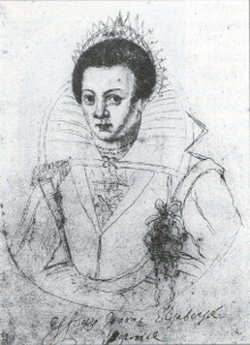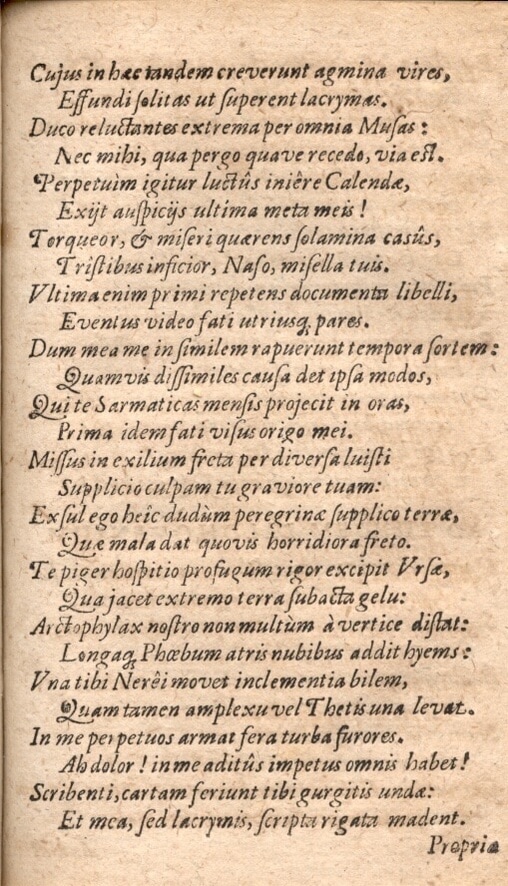 Elizabeth was a Latin poet who was possibly born in Chipping Norton but lived most of her life in Prague! Her early family history is very complicated but at some point between 1589 and 1591 her mother moved to Prague and married one Edward Kelley, a con-man, magician, alchemist and close associate of the infamous Dr. John Dee. In spite of the disreputable qualities of her step father, Elizabeth received an excellent Classical education. However, eventually Edward Kelley was 'rumbled' by his patron , Emperor Rudolf II, after he failed to fulfil his promises of being able to transmute base metals into gold. He was subsequently imprisoned and eventually he died of ill-treatment. Elizabeth Weston, who was 15 at the time of his death, believed in him absolutely. She saw him as an unjustly mistreated man, and campaigned vigorously for the restitution of his property to herself and her mother. Kelley's death left her (and her mother) on their own financial resources, especially since a son, John Francis, died soon after his stepfather. Astonishingly, she responded to this by becoming a writer. Her literary activity seems to have been conducted with complete professionalism. A very large proportion of her Latin poems consists of poems in praise of various grandees, mostly in Prague: this is exactly what one would expect from a writer in the public arena, dependent on patronage. In 1603, she married Johannes Leo of Eisenach, a lawyer. He was also interested in alchemy. Weston continued to write, while the pair had seven children (four sons and three daughters) before her early death. Three daughters survived her. Her poetry, all written in Latin, is very much in the Classical tradition. Here is one in which she adopts the persona of the poet Ovid, who also suffered as an exile in a very foreign land. While the poem is totally in accordance with the form and traditions of Classical elegiac verse, it is, by no means a stitching together, as it were, of Ovidian tags. The language and phrases, while firmly based in the conventions of the genre, show originality and innovation. For more see:
Sors tua, Naso, tuae præcium artis, plurima mecum De proprio voluit participare malo: Cujus in hæc tandem creverunt agmina vires, Effundi solitas ut superent lacrymas. 5 Duco reluctantes extrema per omnia Musas: Nec mihi, qua pergo quave recedo, via est. Perpetuo que igitur luctus iniére Calendæ, Exijt auspicijs ultima meta meis! Torqueor, & miseri quaerens solamina casus, 10 Tristibus inficior, Naso, misella tuis. ultima enim primi repetens documenta libelli, Eventus video fati utriusque pares. Dum mea me in similem rapuerunt tempora sortem: Quamvis dissimiles causa det ipsa modos, 15 Qui te Sarmaticas mensis projecit in oras, Prima idem fati visus origo mei. Missus in exilium freta per diversa luisti Supplicio culpam tu graviore tuam: Exsul ego heic dudum peregrinae supplico terræ, 20 Quae mala dat quovis horridiora freto. Te piger hospito profugum rigor excipit Vrsae, Qua jacet extremo terra subacta gelu: Arctophylax nostro non multum vertice distat: Longaque Phoebum atris nubibus addit hyems: 25 Vna tibi Neréi movet inclementia bilem, Quam tamen amplexu vel Thetis una levat. In me perpetuos armat fera turba furores. Ah dolor! in me aditüs impetus omnis habet! Scribenti, cartam feriunt tibi gurgitis undae: 30 Et mea, sed lacrymis, scripta rigata madent. Propria tu defles incommoda: me omnia solam, Quae vix ingenuæ sunt toleranda, gravant. Tu patriam, iröcolumes patriae sed linquis amicos Mi pater et patrii hoc interiere lares. 35 Sauromatae infestant crebris tibi cuncta rapinis: Et mihi, quae non dat, gens furibunda rapit! Noxia fecisti tu lumina: et artis honorem Laesisti: poenas carmen, et error habet: Pro pietate mihi crudelis reddita merces: 40 Culpa etenim tanti nulla probata mali. Jamque tui tecum poterat querimonia luctus Fortia Magnanimi frangere corda viri- Quem non et tenerae moveant lamenta puellae, Damnaque barbaricis vix superanda Getis? 45 Ergo tuo liceat mea fata dolere dolore! Ah melior quanto sors tua forte mea est! Notes: The Tristia ('sorrows') are elegiac poems by Ovid written in A. D. 8-12 the early years of the poet's exile to Tomis (mod. Constanta), a precarious outpost of civilization on the Black Sea. The second Tristia (Book 1 , ii) describes a storm on Ovid's voyage to in December AD 8 1.Naso: Ovid' s full name was Caius Ovidius Naso 7 Calendae: the first day of each month, therefore, the passing months. 11 Ultima... prim: ... libelli: Tristia, 1, xi; this epilogue stresses the physical dangers of Ovid's journey, which present a metaphor for the poet's condition 15 Samaticas: Ovid used •Sarmatia's land' for the region in w hi ch Tomis was situated ( I. ii. 82) 25 Nerei: a sea—god. Tristia Book I was written in the course of the sea voyage ( 1. xi. 1—8) 35 Sauromatae: Sarmatians, a nomad people related to the Scythians; their incursions into the lower Danube basin are a preoccupation of Ovid's in the Tristia 44 Getis: Getae, a Thracian tribe (occupying the banks of the lower Danube; they later acquired the name of Daci (Dacians) Your lot, Naso, the price of your Art,
affords me much in common with my own misfortune, whose powers have finally grown into these armies that surpass the tears I am wont to shed. I lead my reluctant Muses through all extremities and can find no path forward or back. Hence the time has come for grief without end, and I have left behind the outer boundary of my hopes. I am tormented, and seek solace for my wretched fate; in my sorrow my mind is filled by your Tristia. For on reviewing the final pages of your first book, I see the events of each of our fates are alike. For my circumstances carried me to a familiar fate, although the case furnished different particulars. The month that banished you to Sarmatian shores similarly saw the first origin of my fate. Sent into exile over different seas, you expiated your sin with a greater punishment; While I, an exile here, am long a suppliant in a foreign land which gives me woes more awful than any sea. Numbing rigor receives you as refugee under the Great Bear, where the land lies subject to extreme cold; the Bearward is not far distant from my zenith, and a long winter clothes Phoebus in dark clouds. One single storm of Nereus moves your outrage, yet which even one Thetis lightens with her embrace. For me a savage throng arms constant furies; ah the sorrow! each attack finds its way to me! The waves of the sea soak your paper as you write; my writings too are soaked, but with tears. You lament your own discomforts; but I alone am weighed down by all that can scarce be borne by a lady You left your fatherland, your friends, but you left them safe. Here, the spirits ofmy father and my fatherland are both destroyed All the Sauromatae attacked you with frequent raids: And for me, what it does not give, an enraged people snatches! You have made your talents harmful: and stained the honour Of art: The poem, and your sin, have their punishments. On account of my piety, a cruel reward is returned: Even though no crime is proved answering to such evils. If your griefstricken complaint were able to move The strong heart Of a Great—souled man; Who would not also be moved by the laments of a tender girl, And losses scarcely surmountable by the barbarian Getae? Therefore, may I grieve for my fate, through your grief Ah, how much better your luck was than mine!
0 Comments
Leave a Reply. |
Sheffield branch of the Classical Association, founded in 1920
Archives
November 2023
|



 RSS Feed
RSS Feed
